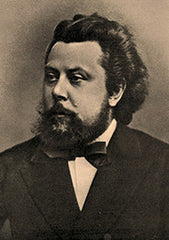The Russian Composer Modest Mussorgsky's Works and Life
Modest Mussorgsky: Overview
- Born: March 21, 1839 - Karevo, Russia
- Died: March 28, 1881 - St. Petersburg, Russia
- Historical Period: The Romantic era
- Musical Media: Orchestra, Keyboards, Choral, Opera, Songs

Modest Petrovich Mussorgsky was a composer born in Russia in the year 1839. During his early years, he joined a musically inclined group called “The Five”, along with composers Aleksandr Borodin, Nikolay Rimsky-Korsakov, Mily Balakirev, and César Cui, whose primary purpose was building a school of Russian music. Two of his most notable works include:
- Boris Godunov
- Pictures at an Exhibition
After a rather turbulent life, and under extremely unfortunate circumstances, the composer passed away in 1881.
Modest Mussorgsky: The Master Who Captured Russia’s Soul
For Mussorgsky, his musical orientation began fairly early when he was six, and he started piano training under his mother. After a year of practice, at the age of seven, he started performing Franz Liszt’s pieces and in 1849, was admitted to St. Peter’s School by his father. There, Mussorgsky learned piano alongside his general education. In the year 1852, he joined the Imperial Guards Cadet School, producing his first musical piece, Porte Enseigne Polka or Podpraporshchik. Here, he progressed from a cadet to gaining a commission in the elite Imperial Regiment (Preobrazhensky Regiment) and met Alexander Borodin, a medical officer in the army, who would himself go on to become a famous composer.
In 1856, Mussorgsky met Russian composer Aleksandr Dargomyzhsky through a fellow soldier in the regiment. It was at this time and place that Modest Mussorgsky discovered the music of Mikhail Glinka. Also, at one of the many soirees of composer Dargomyzhsky, Mussorgsky met Mily Balakirev, who imparted advanced music lessons to the upcoming artist.
After the abolition of serfdom in the year 1861, Mussorgsky’s family lost its primary income. This followed the composer taking up a civil servant job in 1863, at the Ministry of Communications. The death of his mother in the year 1865, led Modest Mussorgsky to become an alcoholic. After trying his hand at a number of projects in 1866, the composer wrote some noteworthy pieces, namely, Darling Savishna, Hopak, and The Seminarist. In 1867, the famous symphonic poem Ivanova noch na Lysoy gore, or Night on Bald Mountain was produced and followed in 1868 by Detskaya. Mussorgsky was mainly self-taught in his style and artistry and worked on a number of operatic works like Salammbo, but he never finished them, as he lost interest midway through the compositions. However, passages from Salammbo were later used in his most famous work, Boris Godunov.
The year 1869 marked the beginning of the composition of Boris Godunov, Mussorgsky’s greatest work, based upon Alexander Pushkin’s dramatic work. Upon submission to the Mariinsky Theater, however, this was rejected, which prompted the composer to rework the piece and give it a darker tone. This version finally saw a premiere in 1874, and was an immediate hit, elevating Modest Mussorgsky to a metaphorical high pedestal. The composer, during this time, interacted with his relative, Arseny Golenishchev-Kutuzov, who inspired the composer to write the song cycles, Bez solntsa and Pesni i plyaski smerti. Additionally, he composed Kartinki s vystavki, a piano suite, after his close friend, the painter Victor Hartmann passed away.
Modest Mussorgsky's musical style is irrevocably Russian and intently speaks of its peasants, folk tunes, and supernatural legends. With a view to expressing the Russian soul, delved into the peasantry and harsh winters, his music is deliberately raw in tone. Nikolai Rimsky-Korsakov, another Russian composer and a member of The Five, edited and removed errors from Mussorgsky's pieces, which, when published, enhanced the composer’s reputation among musical circles and enthusiasts alike. Modest had a very intense idea of musical expression, which included solid characterizations, and a significant use of the chorus, especially in Boris Godunov. Looking from a technical perspective, Mussorgsky’s particular use of musical aesthetics and tonality demonstrates his method of bringing together the arioso and the recitative.
Mussorgsky’s final years saw him write Sunless, Khovanschina Prelude, Pictures at an Exhibition (music about 10 paintings that his close friend, Victor Hartmann painted), and The Fair at Sorochyntsi, based on Nikolai Gogol’s short story. His health started deteriorating post-1881. He never recovered from his illness and passed away that same year. He was consequently laid to rest at Tikhvin Cemetery in Saint Petersburg. Living a short life full of strife and depression, the talented composer still managed to leave behind a series of notable works and a legacy for others to follow.
Reference Links:
- Modest Mussorgsky on Britannica
- Modest Mussorgsky on Classical Net
- Modest Mussorgsky on The Famous People
- Modest Mussorgsky on Favorite Classical Composers
- Modest Mussorgsky on ThoughtCo
- Essential Dictionary of Composers by Alfred Publishing
Related piano sheet music:
- Mussorgsky's pieces: Piano sheet music at multi-levels
- By Russian Composers: Piano sheet music at multi-levels
- Music from operas: Piano solo sheet music at multi-levels
- Music from orchestral pieces: Piano solo sheet music at multi-levels
- Classical music: Piano sheet music at multi-levels
- Classical Piano and Keyboard music: Piano sheet music at multi-levels
- The Great Gate of Kiev: Pick your level - Piano sheet music
Read about other Russian composers:
